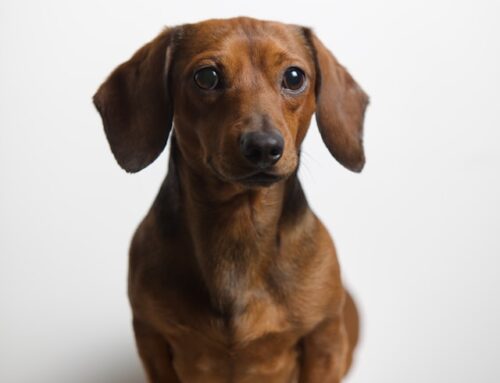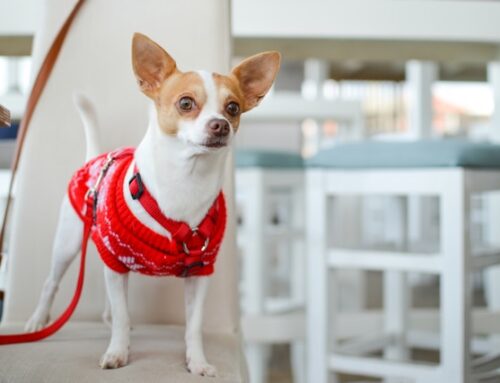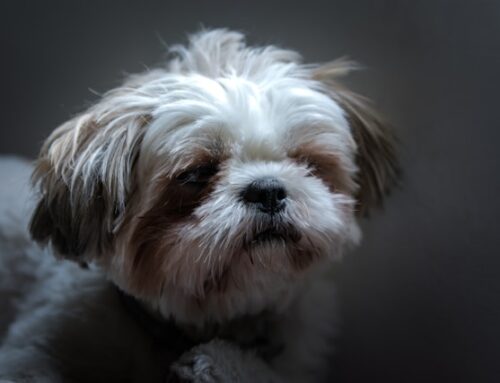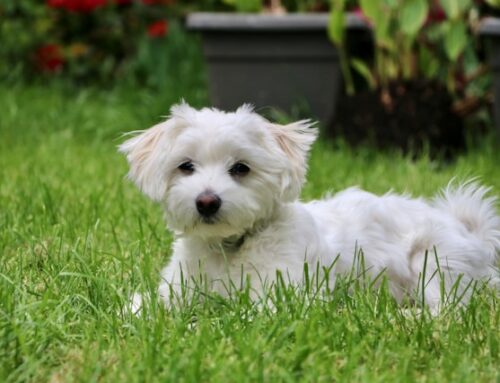Overview
Introduction: Why Are Dogs Scared of Fireworks

Fireworks, a source of awe for us, can turn our furry friends into bundles of nerves. But why does the mere sight and sound of fireworks send dogs into a tailspin? Let’s delve into the canine psyche to understand the mysteries behind their fear.
Setting the Scene
Imagine a quiet evening, stars twinkling, when suddenly the sky erupts into a symphony of colors and thunderous roars. For us, it’s a celebration; for our dogs, it’s a cacophony of terror.
The Prevalence of Canine Firework Fear
Surprisingly, your dog isn’t alone. Many dogs, irrespective of breed or background, share this anxiety, making it a widespread concern among pet owners. The loud noises during a fireworks display can cause dogs to become scared and anxious. Understanding dog behavior during such events is crucial to helping them remain calm.
Many dogs instinctively seek refuge indoors, as being inside can provide a sense of security when faced with loud noises. Helping your dog remain calm during fireworks, especially on occasions like New Year’s Eve, requires understanding and addressing their noise phobia and anxiety.
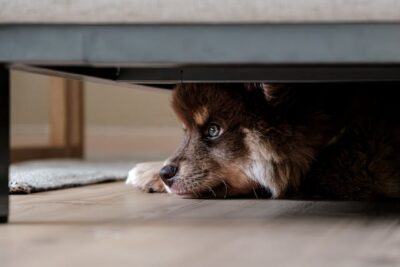
Understanding Canine Sensitivity
To comprehend why dogs cower at fireworks, we must explore their heightened sensitivity, both in terms of hearing and emotions.
Canine Auditory Sensitivity
Dogs boast an acute sense of hearing, surpassing ours. Fireworks, with their explosive sounds, can be overwhelming, causing discomfort and fear. The loud noise from fireworks display contributes significantly to a dog’s stress, and many dogs are scared of the unpredictable bangs and flashes.
Most dogs, during firework-heavy holidays like Independence Day, may exhibit signs of being a fearful dog, seeking refuge indoors to feel safe.
Canine Emotional Sensitivity
Dogs are emotional beings, and fireworks disrupt their sense of security. Unpredictable bangs and flashes trigger anxiety, leaving them on edge. Understanding the emotional toll of loud noises on dogs is crucial for pet owners aiming to create a safe and calm environment for their furry friends.
Addressing noise aversion and separation anxiety during firework-heavy events, such as New Year’s Eve and Fourth of July, it is essential to keeping dogs safe and easing their anxiety.
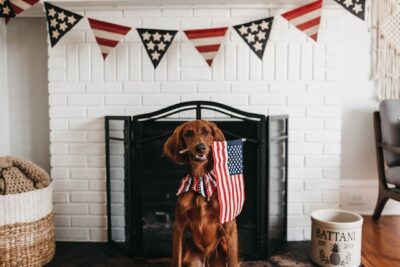
The Origins of Firework Fear
Digging deeper, we find that the fear isn’t arbitrary; it has roots in both evolution and personal experiences.
Evolutionary Perspective
Evolution wired dogs to be cautious of sudden loud noises, associating them with potential threats. Fireworks, a modern creation, trigger this primal response. The bright flashes and unpredictable sounds during a fireworks display can cause heightened anxiety in most dogs, leading to a fearful dog seeking safety indoors. For dogs, especially during firework-heavy events like Independence Day or New Year’s Eve, finding safety inside becomes crucial.
Traumatic Experiences
For some dogs, past traumatic experiences like getting lost during fireworks exacerbate their fear, creating a lasting phobia. Lost pets during such events highlight the importance of creating a secure environment for dogs. Pet owners should take proactive measures to keep their dogs safe, understanding the impact of noise aversion and separation anxiety on their pet’s overall well-being.
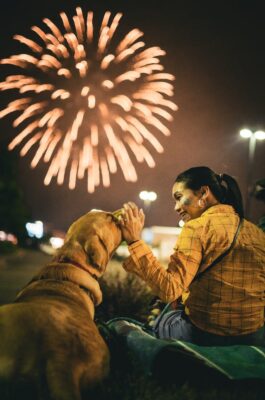
Breaking Down the Firework Experience
Let’s dismantle the firework experience into elements that intensify a dog’s fear.
Sensory Overload
The combination of blinding lights, ear-splitting noises, and the lingering smell of gunpowder creates a sensory overload for dogs, heightening their anxiety. Most dogs find it challenging to cope with the intensity of a fireworks display, leading to a fearful reaction. To keep a dog calm, pet owners should consider creating a safe space inside where the pup’s nerves can find comfort away from the overwhelming sensory stimuli. High cortisol levels, triggered by stress, can adversely impact a dog’s well-being, making it crucial for owners to mitigate the sensory overload.
Unpredictable Nature of Fireworks
Dogs thrive on routine and predictability. Fireworks, being unpredictable, disrupt their sense of order, inducing stress. The sudden and erratic nature of fireworks can trigger fear and anxiety in dogs, making it essential for pet owners to take proactive measures to ensure their dog’s well-being. Providing a secure and familiar environment inside the home can help mitigate the stress caused by the unpredictability of fireworks.

Recognizing Signs of Canine Fear
Understanding your dog’s fear involves recognizing subtle signs and physiological manifestations.
Behavioral Indicators
Watch for trembling, excessive panting, hiding, or clinginess—subtle cues that your dog is distressed. A fearful dog may exhibit behavioral changes during a fireworks display, seeking refuge or displaying signs of anxiety. Recognizing these behavioral indicators allows pet owners to intervene and create a calming environment for their dogs.
Physiological Manifestations
Elevated heart rate, dilated pupils, and excessive drooling are physiological signs of stress in dogs exposed to fireworks. Monitoring these physiological manifestations helps pet owners gauge the severity of their dog’s anxiety. By understanding the impact of fireworks on a dog’s stress levels, owners can implement strategies to minimize the negative effects and ensure the safety and well-being of their furry companions.
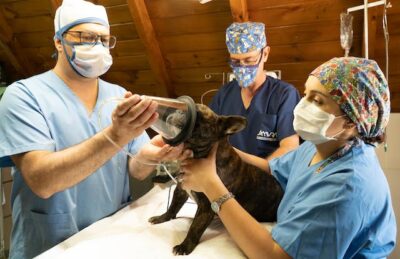
Impact on Canine Well-being
Firework fear isn’t just a passing discomfort; it can have lasting effects on a dog’s well-being.
Short-term Effects
Immediate consequences include stress-induced behaviors, loss of appetite, and difficulty sleeping. When dogs are scared of fireworks, the loud booms and bright flashes can trigger anxiety, leading to short-term behavioral changes. Pet parents may notice their dogs seeking hiding places or exhibiting signs of distress during fireworks displays.
To keep your dog calm during a fireworks show, creating a safe and comfortable environment inside the home is essential. Offering familiar hiding places and providing comforting reassurance can help mitigate the short-term effects of firework fear.
Long-term Consequences
Repeated exposure to fireworks without intervention may lead to chronic anxiety, impacting your dog’s overall mental health. Dogs afraid of fireworks may develop a persistent fear that extends beyond specific events, potentially affecting their long-term well-being. Pet parents should address firework fear proactively to prevent the development of chronic anxiety in their dogs.
Implementing strategies to keep dogs calm during fireworks displays is crucial for mitigating long-term consequences and ensuring a positive mental state.
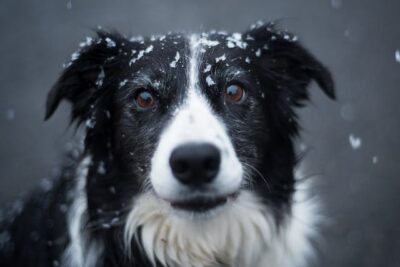
Canine Breeds and Firework Fear
Not all dogs respond the same way. Understanding breed variations is crucial in addressing firework fear.
Breed Variations in Sensitivity
Some breeds, like the Border Collie, are more sensitive, while others, like the Labrador, may display resilience. Dogs exhibit varying degrees of sensitivity to loud noises, including fireworks.
It’s important for pet parents to recognize that individual breeds may have different responses to firework displays. Knowing your dog’s breed characteristics can help tailor strategies to keep them calm and alleviate firework fear.
Factors Influencing Breed Responses
Factors such as genetics, early socialization, and individual temperament contribute to how a dog responds to fireworks. While breed tendencies play a role, individual factors also significantly influence a dog’s reaction to fireworks. Early socialization, positive exposure to various stimuli, and understanding an individual dog’s temperament are key factors in addressing firework fear.
Pet parents can work with their dogs to build resilience and reduce anxiety through positive reinforcement and gradual desensitization.
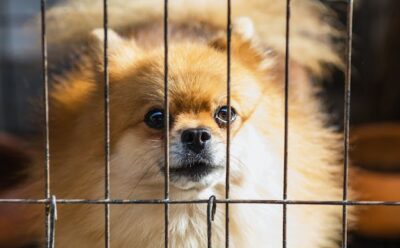
The Role of Dog Owners
As responsible pet owners, we play a pivotal role in mitigating our dog’s firework fear.
Recognizing Responsibility
Acknowledge that fireworks are distressing for your dog, and take proactive steps to alleviate their anxiety. Understanding that your dog is scared of fireworks is the first step in fulfilling your role as a responsible pet parent.
By recognizing this responsibility, you can implement effective strategies to help your dog cope with the anxiety triggered by loud sounds and bright flashes.
Mitigating Firework Fear Through Training
Positive reinforcement, desensitization, and creating safe spaces can help train your dog to cope with firework-related stress. Training your dog to associate positive experiences with fireworks can significantly mitigate their fear. Employing positive reinforcement techniques, such as offering treats and praise during fireworks displays, can create positive associations.
Gradual desensitization by exposing your dog to recorded firework sounds at a low volume and gradually increasing it over time can also be an effective training method.
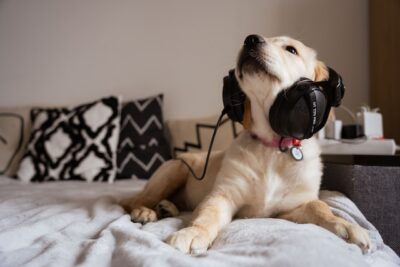
Coping Mechanisms for Dogs
Empower your dog to face fireworks with effective coping mechanisms.
Canine Comfort Zones
Identify and create safe spaces where your dog can retreat during fireworks, offering comfort and security. Dogs often seek refuge in familiar spaces when scared, so designating a cozy area with their favorite bedding, favorite toy, and treats can provide a sense of security.
Make sure the space is quiet, dimly lit, and away from windows to minimize exposure to the sights and sounds of fireworks.
If your dog is crate trained, the crate can serve as a secure retreat during firework displays. Additionally, playing white noise or calming music can help drown out the startling sounds of fireworks, creating a soothing environment. Introducing favorite toys and using calming wraps or a pressure wrap can also contribute to your dog’s comfort and help them feel more secure when the fireworks start.
Noise-Canceling Techniques
Use background noise, like calming music or white noise, to drown out the sounds of fireworks, providing relief for your dog. Play white noise or calming music can help mask the startling sounds of fireworks and create a soothing atmosphere for your dog. Additionally, consider using pressure wraps or vests, which apply gentle, constant pressure to your dog’s torso, promoting a sense of security and calmness.
These coping mechanisms, combined with a well-thought-out strategy, can help your dog stay calm and find safety during fireworks displays. Spending time understanding your dog’s behavior and preferences, along with implementing pro tips like double-checking your dog’s identification tags and providing extra treats, ensures a comprehensive approach to keeping your dog safe during firework-heavy holidays like the Fourth of July.
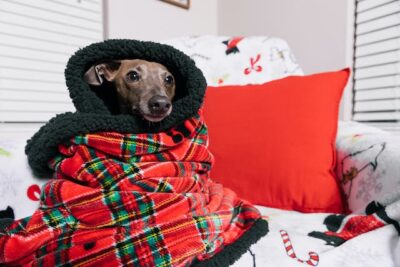
Firework Fear and Canine Health
The toll of firework fear extends beyond behavioral changes; it impacts your dog’s physical health.
Stress-related Health Issues
Prolonged stress may contribute to health issues, including digestive problems and weakened immune systems.
Veterinary Insights
Consulting with a veterinarian can provide tailored solutions, from behavior-modifying medications to holistic approaches. If your dog is scared of fireworks, veterinary behavior specialists may recommend over-the-counter options or anti-anxiety medication to manage their pet’s anxiety effectively.
Canine Firework Fear vs. Other Phobias
Distinguishing firework fear from general anxiety is crucial for effective management.
Distinguishing Characteristics
Understanding the nuances helps tailor interventions, ensuring they address specific triggers associated with fireworks.
Overlapping Symptoms
While distinct, firework fear can overlap with other phobias, complicating the diagnosis and treatment process.
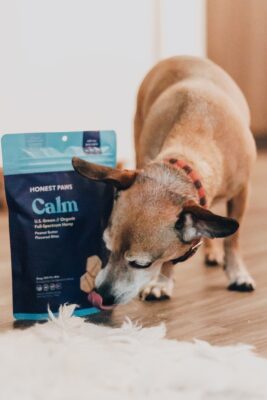
Innovations in Canine Anxiety Management
Advancements in technology and pharmaceuticals offer promising avenues for managing canine anxiety.
Technological Solutions
From anxiety-reducing wearables to apps that simulate calming environments, technology is providing new tools for dog owners to address canine anxieties. These innovations can be particularly helpful as the sun sets and fireworks displays begin, providing additional support to keep your dog calm during loud sounds and behaviors associated with fireworks.
Pharmaceutical Approaches
Medications, when prescribed by a veterinarian, can be part of a comprehensive anxiety management plan for dogs. These pharmaceutical approaches can be tailored to your dog’s specific needs, especially during events like fireworks displays.
Legal Perspectives on Firework Use
Educating communities about the impact of fireworks on dogs fosters empathy and responsible celebration.
Educating Communities
Campaigns highlighting the effects of fireworks on dogs encourage responsible use and consideration for our four-legged friends. By spreading awareness about the potential anxiety and fear experienced by dogs during awe-inspiring displays, we can collectively work towards creating a more dog-friendly celebration environment.
Building Empathy for Canine Anxiety
By sharing stories and experiences, we build empathy, fostering a community that values the well-being of dogs during celebrations. Understanding the emotional toll on our pups during events like the Fourth of July encourages pet owners to double-check their plans and take proactive steps to keep their dogs safe and sound.

Summary of Expert Opinions
Gaining insights from professionals in the field deepens our understanding of canine firework fear.
Veterinarian Insights
Veterinarians provide practical advice, from identifying triggers to recommending anxiety management techniques. Their expertise guides pet owners in creating a safe and comfortable environment for their dogs during firework-heavy holidays.
Canine Behaviorist Perspectives
Experts in canine behavior shed light on the psychological aspects of firework fear and effective intervention strategies. By incorporating their perspectives, we can develop tailored approaches to help our dogs cope with the stress associated with fireworks and other loud sounds.
Frequently Asked Questions
- Q1: Why are some dogs scared of fireworks?
- A1: Many dogs are scared of fireworks due to the loud sounds and bright lights, which can be overwhelming and frightening for them.
- Q2: How can I tell if my dog is scared of fireworks?
- A2: Watch for signs such as trembling, excessive panting, hiding, or seeking comfort. These behaviors indicate your dog may be frightened by fireworks.
- Q3: What can I do to keep my dog calm during fireworks?
- A3: Create a safe and quiet space for your dog inside, away from the noise. Consider using white noise or calming music to help drown out the sound.
- Q4: I have a new dog; how do I know if they are scared of fireworks?
- A4: Pay close attention to your new dog’s behavior during fireworks displays. Signs of fear may include cowering, pacing, or excessive drooling.
- Q5: Can fireworks have long-term effects on my dog’s well-being?
- A5: Yes, prolonged exposure to fireworks without intervention can lead to chronic anxiety, impacting your dog’s overall mental health.
- Q6: How should I prepare my pup for fireworks?
- A6: Gradually expose your pup to recorded firework sounds at a low volume, rewarding calm behavior. This desensitization process can help them become more accustomed to the noise.
- Q7: Is it okay to bring my dog to a fireworks display for fun?
- A7: It’s generally not recommended. The loud sounds and bright lights can be distressing for dogs. It’s better to keep your dog in a safe and quiet environment.
- Q8: Are there any fun alternatives to fireworks for my dog?
- A8: Consider interactive toys, puzzle feeders, or a fun playtime indoors as alternatives to traditional fireworks celebrations that can be enjoyable for your dog.
- Q9: How can I ensure my dog stays safe during fireworks?
- A9: Keep your dog inside, double-check that windows and doors are secure, and provide a comforting space with familiar items like their favorite toys or bedding.
- Q10: Why is sound a major factor in making dogs scared during fireworks?
- A10: Dogs have sensitive hearing, and the loud, unpredictable noises of fireworks can be particularly distressing for them. Creating a quiet and secure environment helps alleviate their anxiety.
Conclusion: Ensuring a Fear-Free Celebration for Our Canine Companions
In unraveling the enigma of why dogs fear fireworks, we’ve uncovered a complex interplay of evolution, sensitivity, and individual experiences. As responsible dog owners, it’s our duty to empathize, educate, and advocate for a world where celebrations coexist harmoniously with our furry companions.
Join us in striving for a future where no pup has to be afraid or tremble in fear at the sight of a firework. Together, we can create an environment where our dogs feel safe, secure, and free from the anxieties that fireworks can bring. For further insights and guidance, visit our blog.

